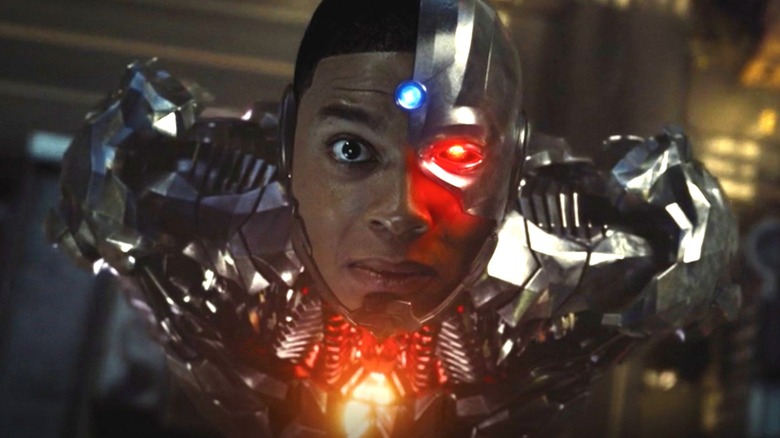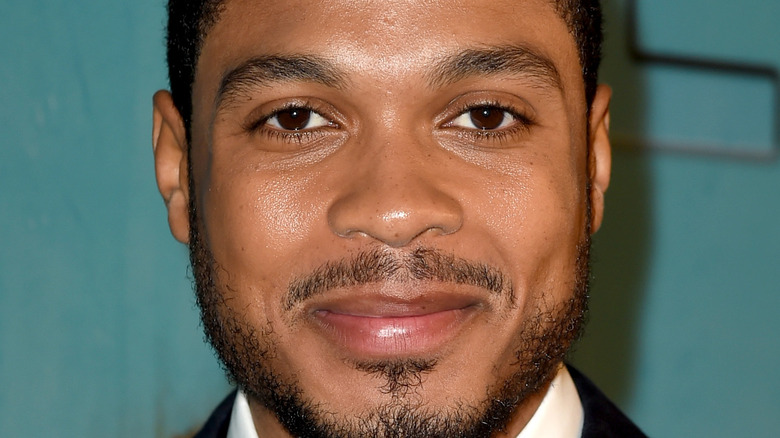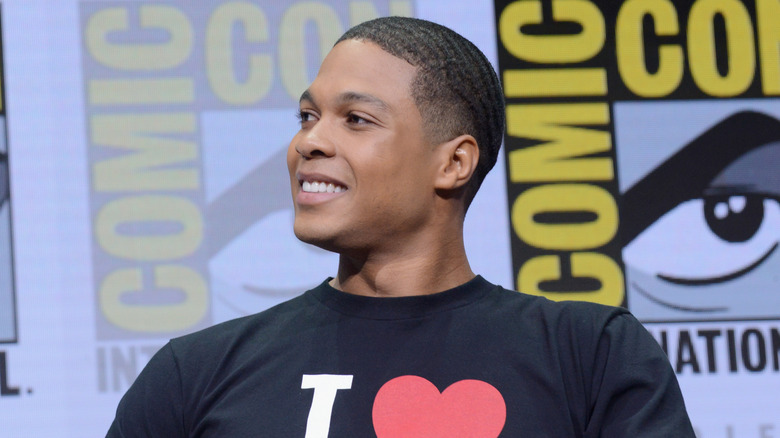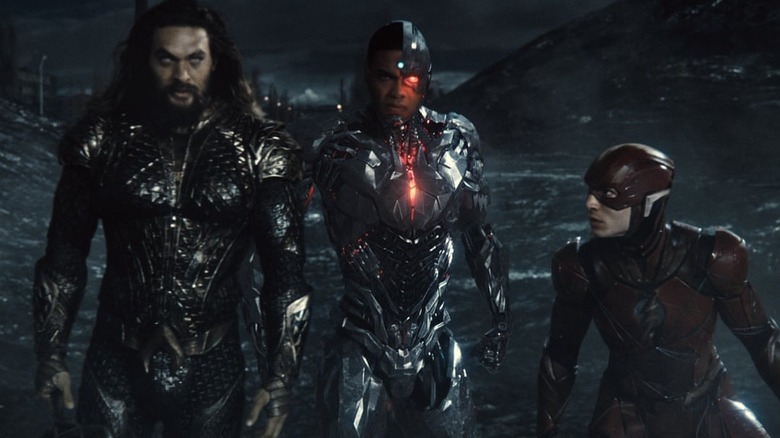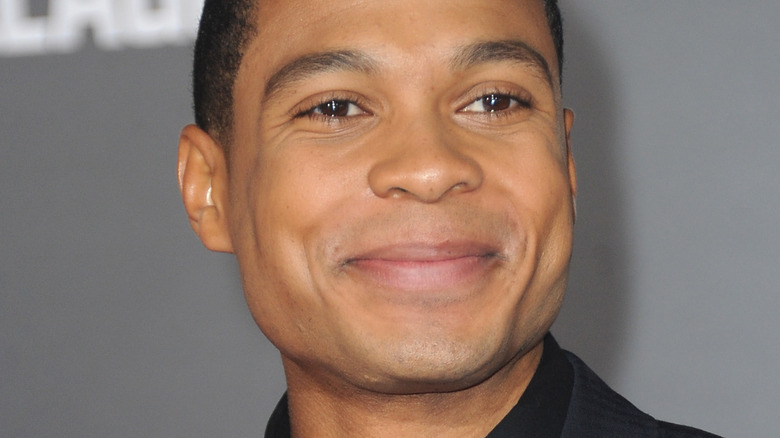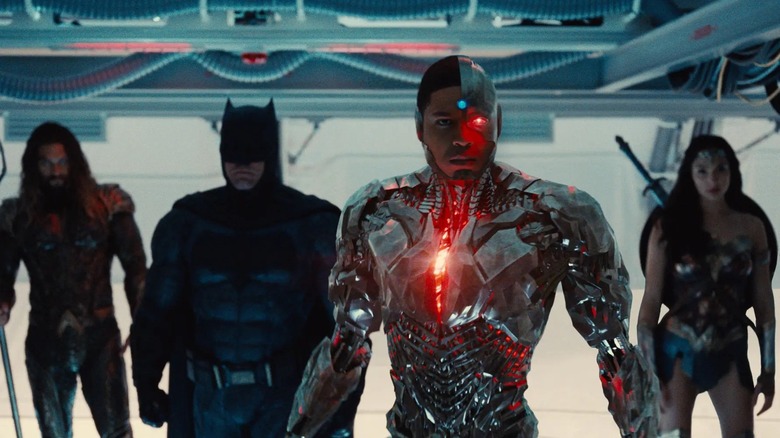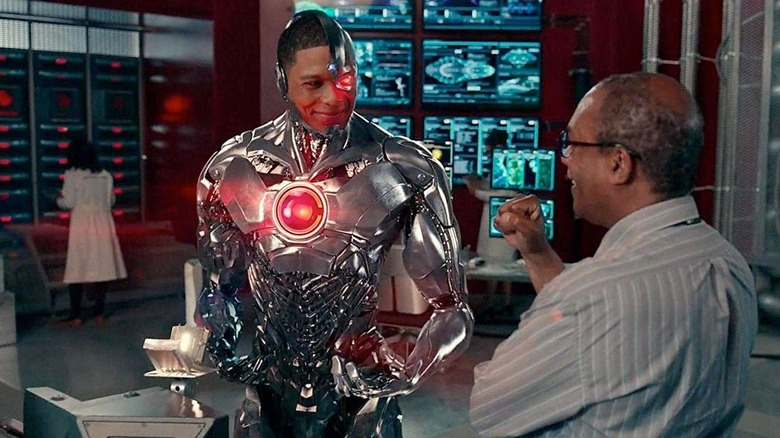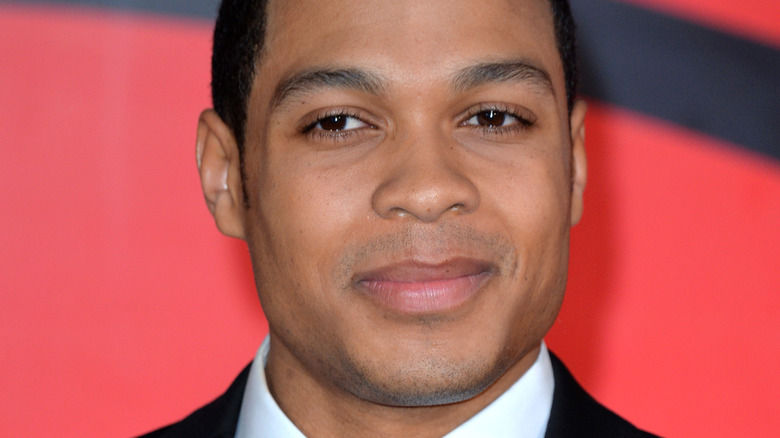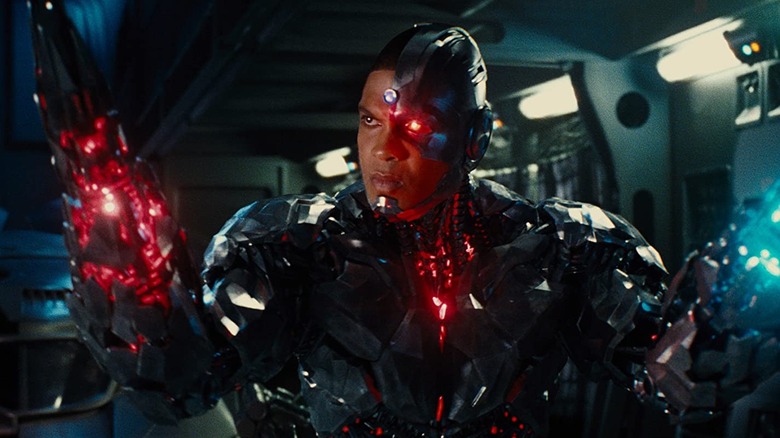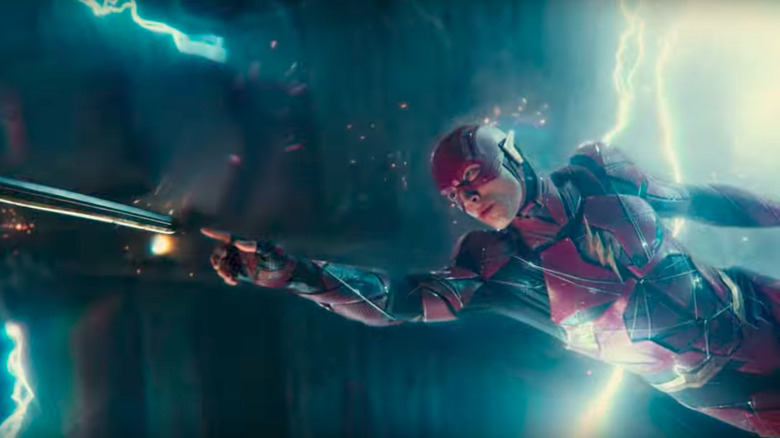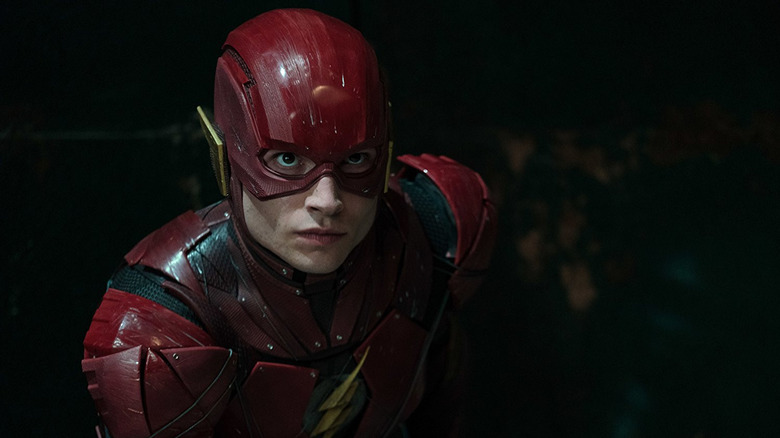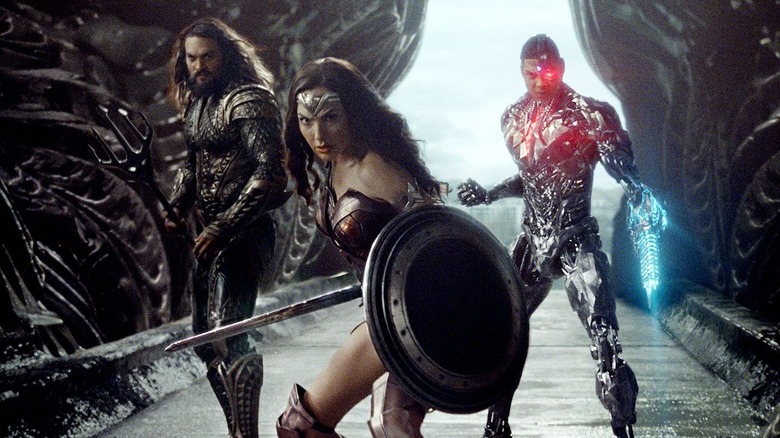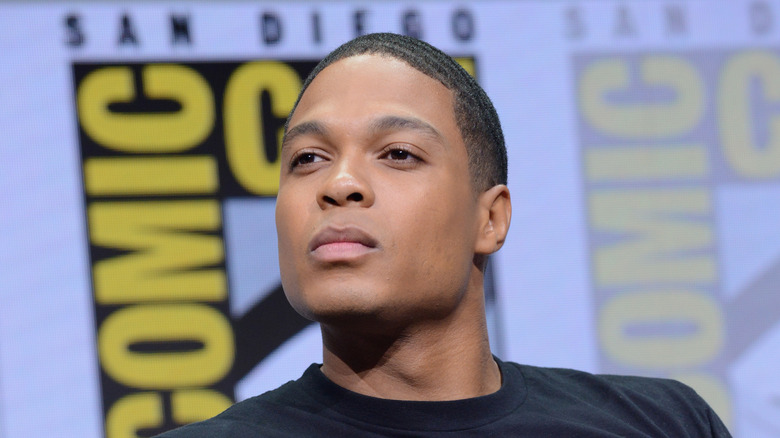The Untold Truth Of The DCEU's Cyborg
The DC Extended Universe (DCEU) version of the Justice League includes DC Comics icons that have always been associated with the team — Batman, Superman, Wonder Woman, Aquaman, the Flash. And then there's the last member, a figure who was primarily associated with the Teen Titans until the New 52 reboot of the Justice League comics: Victor Stone, aka Cyborg. This fresh face in the JLA mythos was brought over to the film incarnation of the superhero team, where he was portrayed by Ray Fisher in "Batman v. Superman: Dawn of Justice" and both versions of "Justice League."
Fisher was considered integral to the blockbuster, with director Zack Snyder dubbing his performance "the heart of the movie." But there's still tons about this iteration of Cyborg that general audiences don't know, including the role's impact on Fisher's career, his creative contribution to the Cyborg character, and much more. The richness of the untold truth of the DCEU's version of Cyborg reflects the fact that, even if Cyborg isn't slated for further appearances in the near future, he'll always be a character that captivates the imagination and attention of moviegoers.
Cyborg was Ray Fisher's first film role
The history of superhero movies is full of performers who got the chance to portray these legendary characters after only a handful of film roles, or even none. Just think of how fresh-faced Brandon Routh and Christopher Reeve were when they took on the part of Superman, or how Simu Liu had only "Kim's Convenience" to his name when he was cast as Shang-Chi. Ray Fisher was very much a part of this tradition when he was first cast as Cyborg in April 2014, his first feature film role of any kind.
Though he wasn't a familiar face to moviegoers, Fisher had already built up a solid career as a performer thanks to his work in theater, including the off-Broadway play "Fetch Clay, Make Man," in which he played Muhammed Ali. He had also delivered other memorable performances at the Shakespeare Theater in New Jersey. Portraying a robotic being tasked with blowing up aliens was certainly a drastic departure from these more stripped-down, grounded roles, but Fisher displayed enthusiasm for the chance to excel as Cyborg from the get-go. After all, as history has proven countless times before, unknown actors can be the perfect picks for superheroes.
Fisher had no idea Warner Bros. was planning a Cyborg solo movie
When Ray Fisher first signed on to portray Cyborg for a cameo appearance in "Batman v. Superman: Dawn of Justice," the actor was well-aware that it was a part that would grow as the years went on — after all, this project was teeing up "Justice League." By contrast, Fisher was totally unaware that his character was scheduled to receive a solo movie, which was announced alongside an onslaught of DC Comics movie adaptations in October 2014.
Speaking to Entertainment Weekly shortly after the project was first announced, Fisher noted that he had never even conceived of a solo movie when he first signed on to play Cyborg — his excitement to be a part of the DCEU was what guided his choice to take on role. However, the prospect of portraying Cyborg in a solo project was an exciting one for Fisher, and he perceived it as reflecting how committed the Warner Bros. brass was to this character. He also noted that it was daunting to commit to a movie that was, at that point, six years away, but that the schedule also played into his self-description as "a long-game player."
Cyborg is largely a CGI creation
In the modern world of filmmaking, CG enhancements are inevitable. Even adult dramas like "The Wolf of Wall Street" and "Parasite" have heavily utilized digital backdrops for critical environments. This trend is especially prominent in the world of superhero cinema like "Justice League," and Ray Fisher's Cyborg would be brought to life primarily with CGI.
In 2016, Warner Bros. revealed that Cyborg was being realized through motion-capture during principal photography, with every part of his body except his face entirely covered in materials that would later be digitally replaced. In the promotional lead-up to "Justice League's" theatrical release, official behind-the-scenes photos offered additional looks at the suit Fisher had to wear on set. This puts Fisher's largely-CG performance in the same territory as other digitally-enhanced superheros, such as Mark Ruffalo's Hulk.
Though a significant and drastic measure, realizing Cyborg primarily through CGI makes sense. After all, the character is largely covered in robotic parts, which would be difficult to execute using practical effects. Plus, having Cyborg brought to life in this manner immediately differentiates him from his "Justice League" cohorts, who all had practical costumes to work with when filming.
Fisher helped mold the Cyborg character
Despite Cyborg being Ray Fisher's first foray into film acting, Fisher had a deep connection to the character and even had a voice in how Cyborg was presented. In 2021, "Justice League" screenwriter Chris Terrio revealed that he and Zack Snyder talked extensively with Fisher about Cyborg when they were planning the film, and Fisher's suggestions for the superhero informed the screenplay. The rapport between these artists was a gracious one that allowed for multiple perspectives to coalesce in the name of making Cyborg as strong a character as possible.
Unfortunately, this positive experience in the development phase was in heavy contrast to Fisher's time during the reshoots for "Justice League," when his voice was not nearly as valued. On the contrary, Fisher's disagreements with reshoots director Joss Whedon and other producers in the film are now the stuff of infamy. These creative problems stemmed largely from Fisher's own opinions and preferences (including his discomfort with saying the word "Boo-yah") being discarded in this phase of the film's creation. It was a disappointing turn of events, but one that only reinforced the positive aspects of Fisher's earlier days in portraying Cyborg.
Cyborg is allegorical
No art or fictional character exists in a vacuum. Everything has a larger resonance or connections to the greater world in which it exists. Whether it's classic literature or children's television, deeper meaning can be found in anything. The same is true of superheroes in blockbusters like "Justice League," and Ray Fisher has always been open about how the DCEU's Cyborg was never meant to just be another guy punching CGI villains. Fisher saw the character as representing something more, something larger and important.
"You've lost a sense of yourself," Fisher said on TheNiceCast in 2020, discussing how Victor Stone navigates his existence as Cyborg, a superhero identity he had no say in obtaining. "It's about finding that again, finding that humanity again. And there's a ton of allegory with respect to that in being a Black man, and just the journey that Black people have taken in this country. It can go as deep as you will allow it to, and I thank my stars I was in the capable hands of Chris and Zack to able to be like, 'Hey listen, how far we want to take this? Because this can hit some hearts, man. It can really hit some hearts.'"
In being cognizant of the deeper meaning within Cyborg, Fisher found something personal and relatable he could tap into as a performer while inhabiting a larger-than-life character on a mission to save the world.
Fisher wanted the Cyborg movie to be diverse
When the "Cyborg" solo movie was announced in 2014, it was one of the first prospective 21st-century superhero movies to feature a Black lead. Years later, even with the enormous success of "Black Panther," superhero films headlined by Black performers are still rare, making the necessity of projects like "Cyborg" all the more apparent. When this solo outing was in the development stage, however, Fisher was adamant that "Cyborg's" approach to diversity not just begin and end with its leading man, but rather extend to the entire cast and crew.
In November 2017, Fisher explained that he wanted a "Cyborg" film to utilize cast and crew members from a wide array of backgrounds. He referenced the then-upcoming "Black Panther" as a model for how superhero films could use diverse casts to create new cultures and styles of visual language, and Patty Jenkins and her work on "Wonder Woman" as a model for how to break new ground and open the doors for anyone to make a superhero movie. Fisher also mentioned that the story of "Cyborg" wouldn't resonate with only one demographic, with the titular hero's story being something that Fisher saw as having universal appeal.
The Cyborg movie never happened
As the years went by following Warner Bros. 2014 DCEU movie announcements, it became clear that some of the announced projects were actually going to be released, and some were going to die on the vine. For example, while "Aquaman" made its 2018 release date and "Shazam!" came out in 2019 as originally planned, "The Flash" was delayed for years. That's still better than the "Cyborg" movie, though, which doesn't look like it will ever get made. So far there hasn't even been a whisper of movement on the project, with no screenwriters, let alone a director, announced for the production.
In 2018, Fisher offered his perspective on why a solo "Cyborg" movie wasn't a top priority for the studio, and it all came down to dollars and cents. Since Cyborg is a largely CGI character, it would cost an exorbitant amount of money to center a live-action movie around him — at least in a "Justice League" film, there are cheaper characters the camera can focus on for the majority of the production. Though it's unclear if this was the real reason Warner Bros. never actively pursued the "Cyborg" movie, this speculative reason from Fisher speaks to the enormous obstacles this project always faced.
Cyborg was supposed to appear in the original Flash movie
In the initial landscape of DCEU movies, the supposed 2018 "Flash" film was scheduled to be directed by Rick Famuyiwa, who was then fresh off the indie hit "Dope." Though the Flash himself would obviously be the film's centerpiece, it wasn't long into the development cycle before it was revealed that Cyborg would also have a prominent role.
One of the earliest indicators of this came about in September 2016, when Famuyiwa took a selfie of himself with Miller and Fisher. A few weeks later, Famuyiwa shared a photograph of a new draft of the screenplay for "The Flash," with Funko Pop! figures of both the Flash and Cyborg in the image. Meanwhile, a handful of moments in the theatrical cut of "Justice League," including one involving robbing a grave, seemed to be establishing the concept of the Flash and Cyborg as a duo to moviegoers. However, Famuyiwa would leave "The Flash" in October 2016, explaining that "we couldn't come together creatively." With Famuyiwa gone, this iteration of the project was put on ice, and Cyborg fans everywhere were left in the dark.
Cyborg was still set to appear in The Flash
After Rick Famuyiwa's departure, "The Flash" spent a significant amount of time in development, with constant rumors about new screenwriters and directors taking on the project. All the while, it remained uncertain over whether or not Cyborg would still be in the movie. The initial plan had been for the "The Flash" to set up and lauch Cyborg's solo film, but by the time Andy Muschietti stepped (slowly) into the director's chair in 2019, the "Cyborg" movie had been tabled, just one of many radical alterations to the DCEU's release schedule.
However, in June 2020, Cyborg fans got a burst of good news when Barbara Muschietti (the film's producer and Andy's sister) confirmed that Cyborg would appear in the film — indeed, according to Fisher, most versions of "The Flash" had always featured some kind of role for Cyborg. The full details of what Cyborg would've done in this incarnation of "The Flash" are unknown, as is any information on what kind of future DCEU events they might have set up. Still, the character's presence in the original version of the Muschiettis' movie confirms that Warner Bros. was comfortable with keeping Fisher's Cyborg around ... until they weren't.
Cyborg was removed from The Flash
In the early days of 2021, just before "The Flash" finally began principal photography, news broke that Ray Fisher's Cyborg would no longer be a part of the movie. With the slate of DCEU films fundamentally altered and neither a solo "Cyborg" movie nor a "Justice League" sequel on the horizon, Cyborg's importance to Warner Bros. had decreased drastically. More critically, however, in the months leading up to the news that Fisher would no longer be in "The Flash", the actor had become more and more vocal about alleged inappropriate behavior from studio executives during the reshoots for "Justice League" in 2017.
While Warner Bros. never confirmed that these allegations were connected to Fisher's departure, the studio seems to have written Cyborg out of "The Flash" entirely while confirming that the role would not be recast. Though Fisher would maintain a presence in the then-upcoming "Zack Snyder's Justice League," this development also led to the exclusion of Cyborg from the future of the DCEU. The franchise's disinterest in the character was reinforced when it was reported that a cameo of Cyborg's silhouette was filmed but cut from a closing scene of the season one finale of "Peacemaker."
Fisher took a moral stand against Warner Bros.
At a time when Michael Keaton is returning as Batman decades after he last tackled the character and Patrick Stewart is rumored to be reprising the role of Charles Xavier for "Doctor Strange in the Multiverse of Madness," it seems like no superhero movie actor ever truly abandons the genre. Ray Fisher as Cyborg, though, is a drastically different case. Fisher's removal was not due to salary issues, but is part of a longstanding and ongoing dispute between the actor and key creative personnel involved in the "Justice League" reshoots.
In January 2021, Fisher published a letter on social media explaining the circumstances that led to his removal from the DCEU. According to Fisher, he had informed Warner Bros. a few weeks prior that he would not work on any DC Comics movie that involved current DC Films head Walter Hamada, claiming that Hamada had attempted to disrupt an investigation into the "Justice League" reshoots to protect producer Geoff Johns. Fisher noted that he was disappointed to not have the chance to reprise the role of Victor Stone, but that he felt it was more important to increase awareness of these allegations than to portray a superhero. Though a gravely disappointing day for fans of Fisher's Cyborg, the actor's response elegantly kept things in perspective.
Fisher would play Cyborg again, conditionally
Since Fisher's departure from the role of Cyborg, the DCEU has shown no interest in the character beyond featuring him as originally envisioned in "Zack Snyder's Justice League." Fisher, meanwhile, has moved on to roles in other projects, including Zack Snyder's latest, "Rebel Moon." Even after everything he's experienced, however, Fisher hasn't completely given up on his DCEU character. In fact, he maintains that he would be willing to portray Cyborg once again, under the proper circumstances.
Shortly after the announcement that he wouldn't appear in "The Flash," Fisher revealed that he would play Cyborg in a "Justice League" follow-up ... but only if Zack Snyder was in the director's chair. Fisher's loyalty to Snyder went so deep that he said he'd answer a call from Snyder no matter what. "He could be like, 'Yo, I'm gonna do a Dawn of the Dead 2 and we want you to play a zombie,' I'd be like, just put me way in the back, I'm fine with that."
Given the circumstances behind Fisher's departure and the fractured relationship between Snyder and Warner Bros., this outcome seems next to impossible in the current world. However, Fisher has made his passion apparent, and fans can only hope that someday, that passion is translated into an opportunity for him to portray Cyborg again.
